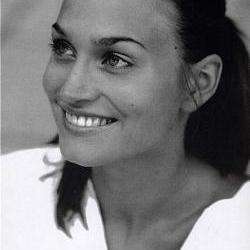Ildikó Raimondi made her debut at the Vienna Volksoper in 1990 and moved quickly on to the Staatsoper where she has since sung over 50 roles and become a household name. In honor of her quarter-century anniversary of her debut, however, she is appearing at the Haus am Gürtel as Hanna Glawari, in Die Lustige Witwe. Marco Arturo Marelli’s extravagant art deco production of Lehár’s operetta is not new – in fact it has been running fairly solidly since 2011, but as one of the most successful productions available at the Volksoper, it was an appropriate and lighthearted choice to celebrate Raimondi.
The bulk of the action moves around a curved backdrop of modernity stretching to the heavens – linoleum tiling next to metal fixings, next to neon strips and so on. The entity moves freely, exposing at times a view of Paris through windows which comprise the very back of the set. The costumes are predominantly beautiful robes and tuxes (Dagmar Niefind) and the gowns worn by Raimondi are particularly splendid. A departure from this basic structure only occurs in the final act when Maxim and crew arrive and dance their way out of a massive turquoise top hat. The girls are dressed in gaudy red cancan costumes and everything becomes several degrees more glitzy – borderline tacky – but if a sense of opulent decadence was what Marelli was going for, he absolutely nailed it. Even in the daytime scenes, the “lights on” version of the stage and the city of Paris in overlook appear cheap and tawdry. Magic (and love) is made exclusively at night where jewels, sequins and lights flash and sparkle in the candlelight.
Mathias Hausmann is an extremely satisfying Danilo, well-matched to his Hanna. Instead of a juvenile drunkard, his Danilo has a more reserved, embittered air which complements Raimondi’s wry worldliness. Vocally there is nothing to complain about with Hausmann – his rich baritone is always a delight. There are a multitude of other characters, large and small, deserving of mention – not the least of which Njegus (Boris Eder), who bikes, drinks and quips throughout the production, comically weaving the evening together. The dance corps of the house is also utilized particularly well, and some of Marelli’s innovations, such as the “Weiber”… “Männer” scenes which frame the interval are absolute jewels.
The one thing that really disappoints is linked to acoustics – an issue which the Volksoper is no doubt struggling to address right now. It is a notoriously difficult hall to carry in, and for this reason many productions of the house in both musical theatre and operetta over the last few seasons have been amplified. This production, however, is not and both Valencienne (Mara Mastalir) and Raimondi herself have a difficult time making themselves heard. The lush, string scoring of Léhar – who knew how to tug at heartstrings but not so much how to balance orchestral scoring and middle-voice singing – poses an additional challenge. Having seen this production several times with a number of brilliant Valencinnes, I have yet to hear one who can cut through those orchestral textures, despite their admirable efforts. And before we pile on conductor Alfred Echwé for not doing as much as he might be able to keep the orchestra at bay, it´s worth pointing out first off that casting Valencienne with lyric or light lyric sopranos might not be a wise choice, as there is not voice of that type who has a chance at coming through in middle voice. Ms. Mastalir, in possession of an absolutely lovely, well-rounded and well-placed instrument was working harder than anyone should have to, and it was largely in vain. Moreover, Raimondi was also not terribly present vocally, and one cannot accuse her of having an instrument too small for this house. Although she had beautiful moments in the soft Vilja Lied, for example, it was often simply difficult to hear her.
I hope the Volksoper is able to find the funds to invest in improving its acoustics without resorting to technical assistance - but then not everyone has Graf Danilo’s easy access to the Merry Widow’s fortunes.




